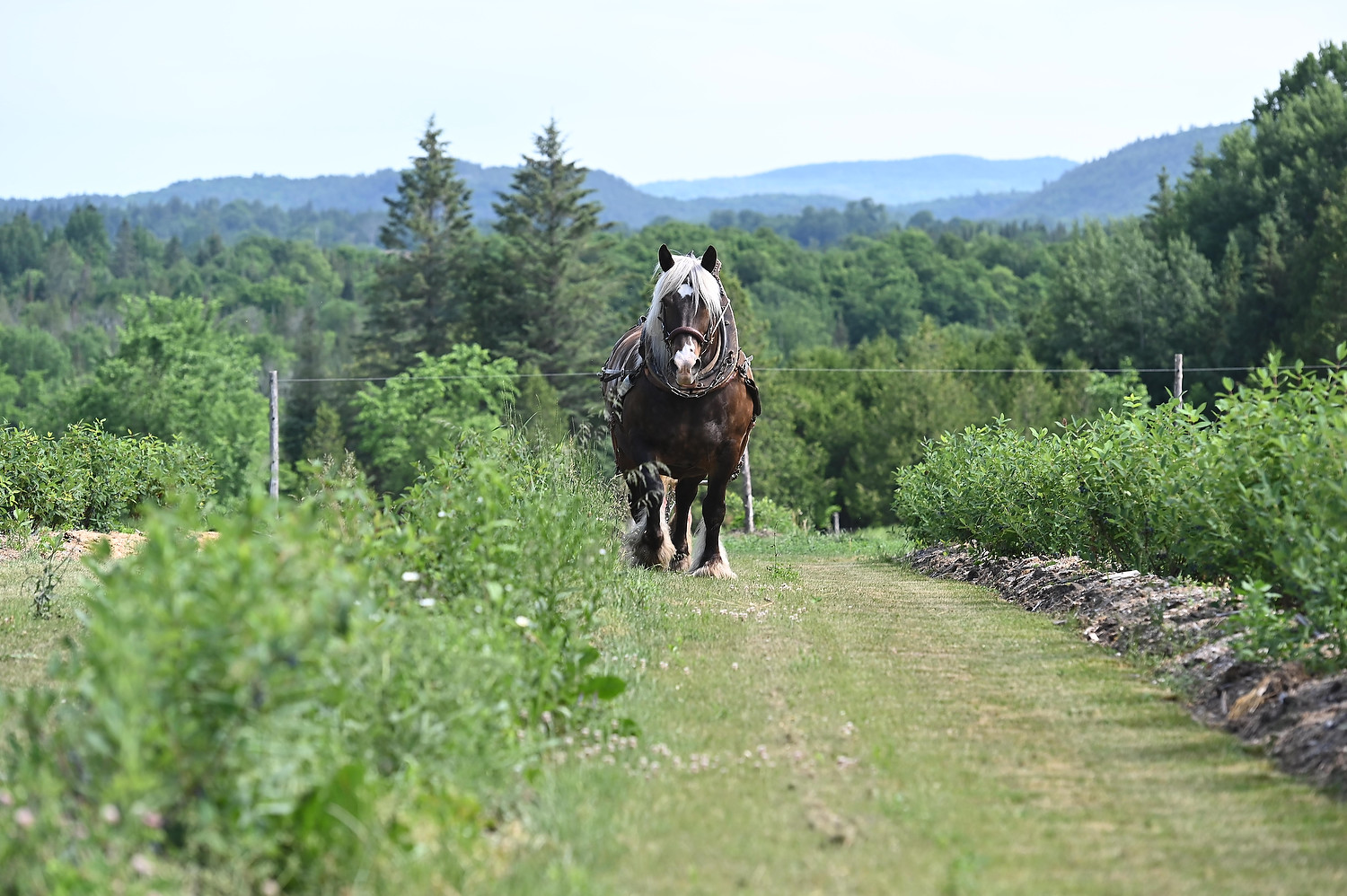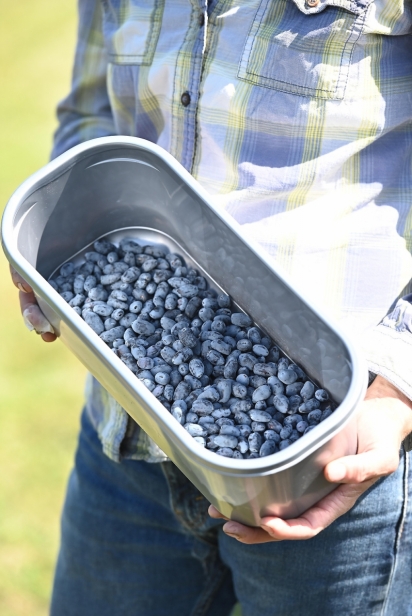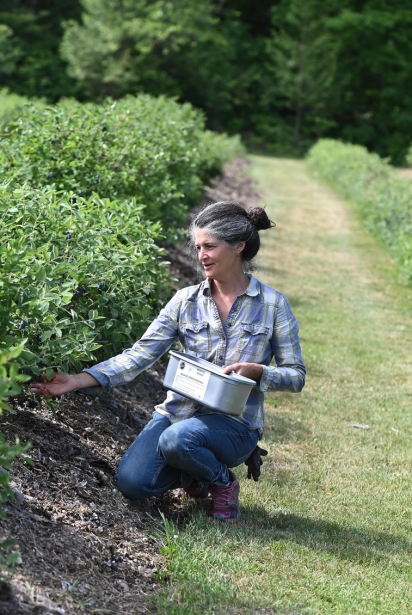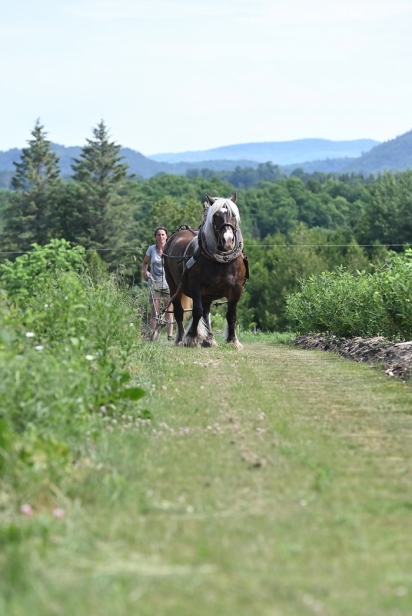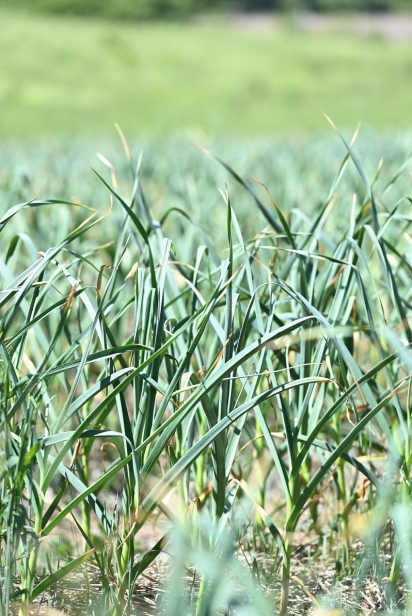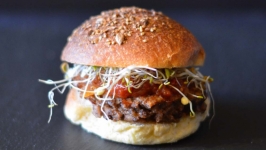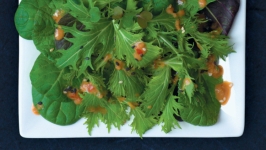From Garlic and Blueberries to Haskap Wine
When Thea Pratt and Tom Bernier bought their farm in Farrellton, just north of Wakefield, Que., in 2010, they took possession of 237 acres and a ruined farmhouse. For four years, they commuted from Montreal with their two children, now aged 13 and eight on weekends, and spent summer holidays living out of a shipping container they placed on the land.
Now, 11 years later, they’ve made giant strides. They’ve built a farmhouse on the original footprint of the ancient homestead and no longer commute from Montreal. They’ve grown their original crop of 900 heads of garlic to more than 12,000, all of which sells before it’s out of the ground in August. And now they’ve turned their attention to berries — haskaps and blueberries.
They’ve named the farm Northslope. “We decided on fruit in our farm expansion thinking this slope to the North would be advantageous as the plants might decide to flower a bit later than plants on a south face,” Pratt explains. “The idea being to keep flowers safe from late spring frosts.”
However, before they planted either of these fruiting bushes, the couple spent several years preparing the neglected ground by fixing the drainage in the heavy clay soil, “because blueberries don’t like wet conditions,” says Pratt. Next they added huge quantities of mulch and compost, then planted cover crops such as oats and red clover, and planned the long rows for planting. It’s back-breaking work.
“I really enjoy the hands-on, physical work with the soil,” explains Pratt, which may sound surprising coming from a talented French horn player who has performed and recorded with several bands. But she’s full of surprises. She’s also a stop- motion animator, who teaches the art form to students all over Quebec. Yet farming is in her blood; she grew up on a farm in the Eastern Townships, as did her husband Tom Bernier, who has a PhD in biosystems engineering. This background in engineering is useful on a farm as he’s a machine expert.
He builds and converts agricultural machinery for the job at hand. Recently he’s created a garlic harvester and a trenching machine, converted a manure spreader to accommodate wood chips and even built machines for neighbouring farms Roots and Shoots and Ferme Lève-tôt.
At the end of 2016, the couple planted 800 blueberry bushes, each only as large as a tiny twig. “In 2017, we took all the flower buds off,” explains Pratt, “so that the bushes put their energy into growing, rather than producing fruit, but we were then besieged by a plague of tent and forest caterpillars. They almost destroyed the crop,” she recalls, “but we patrolled the orchard and we picked them off by hand. We’d come out here three times daily to do this and count them to see if we were winning.” They estimated a kill rate of about 900 a day, and “we paid the kids five cents a ’pilar!” Every year since, in late winter while the snow is high, Pratt patrols the trees to spot and destroy the caterpillar egg casings, which contain more than 300 eggs.
The next year was not simple either. During the winter of 2017- 2018, deer were a big problem.
“They ate all of the flower buds off of the plants, leaving us with little to no flowers the following spring,” Pratts says. “That is why we put up a fence. Mostly they are a problem when the grass dies off in the late fall and they are looking for more to munch on. Once the grass comes back in mid-spring, we take the temporary fence down.”
By 2019, they were successful in harvesting a small crop for family consumption, and 2020 marked their first crop to sell. “We are hoping to open for our first season of u-pick in 2021,” Pratt says.
But back to the garlic. Pratt sourced her primary seeds from Pigeon Hill in the Eastern Townships and the remainder from Salt Spring Island seed stock.
“And there’s one that we call Caloia, after my friend Nicholas, who gave us a [bulb] many years ago,” Pratt says. “Of the 12,000 [bulbs] planted this year, we grow 4,000 of that one.”
They sell most of the crop to friends and family in Montreal, with a few heads making it to the General Store in Wakefield and local restaurant The Village House. Les Fougères in Chelsea buys garlic scapes and this year the couple expects to harvest 340 pounds of them, much of which Pratt will make into her special Great Escape pesto to sell at her new farm kiosk.
In 2016, Pratt and Bernier planted a trial of haskap bushes and they liked what they saw. Haskaps are higher in antioxidants than blueberries; they’re hardy in northern climates and they are versatile. They look like elongated blueberries and have a tangy sweet flavour. Haskap, their Japanese name, means “little present on the end of a branch.” They are also known as edible honeysuckle, blue honeysuckle and honeyberry.
The couple has since expanded that initial planting to 1,000 bushes. They spaced the rows widely so that eventually they can fence and graze a few sheep between the lines. And while the bushes look hardy and healthy, they have already attracted their own pests. In 2020, the crop was attacked by flocks of cedar waxwings. They decimated the harvest, leaving very few berries.
“We even tried chasing them off with a drone,” Pratt recalls, “but now I fear we will have to net them to keep them protected. It’s a shame as we’ve tried very hard to minimize any use of plastic here. We even use recycled tarps for our weeds.”
The next few years promise great things for Northslope Farm. Pratt and Bernier installed a commercial kitchen where Pratt will prepare her scape pesto, haskap lemonade, popsicles and other treats for sale alongside berries and pumpkins at their farm stand. They have plans to launch a winery — haskaps make an excellent, pinot noir style of juice — and Pratt has visions of dinners in nature, if we are ever allowed to gather again.
“I’ve only ever really planted things I love to eat,” Pratt says, “and I love blueberries.”
It’s a fair guess that haskaps now make the grade as well.
Northslope Farm
69 Woods Rd., Farrellton, Que.


